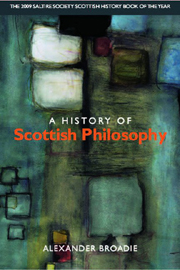Book contents
- Frontmatter
- Contents
- Acknowledgements
- 1 Introduction
- 2 John Duns Scotus
- 3 The Fifteenth Century
- 4 The Circle of John Mair
- 5 Humanism and After
- 6 Scotland Moves into the Age of Enlightenment
- 7 David Hume
- 8 Adam Smith
- 9 The Scottish School of Common Sense Philosophy
- 10 The Nineteenth Century: Ferrier to Seth
- 11 Realism and Idealism: Some Twentieth-century Narratives
- 12 Conclusion
- Bibliography
- Index
3 - The Fifteenth Century
Published online by Cambridge University Press: 12 September 2012
- Frontmatter
- Contents
- Acknowledgements
- 1 Introduction
- 2 John Duns Scotus
- 3 The Fifteenth Century
- 4 The Circle of John Mair
- 5 Humanism and After
- 6 Scotland Moves into the Age of Enlightenment
- 7 David Hume
- 8 Adam Smith
- 9 The Scottish School of Common Sense Philosophy
- 10 The Nineteenth Century: Ferrier to Seth
- 11 Realism and Idealism: Some Twentieth-century Narratives
- 12 Conclusion
- Bibliography
- Index
Summary
Section 1: The context
Scotland's first three universities were founded in the fifteenth century, and prior to the earliest of them, St Andrews, almost all young Scots in search of a university education had gone to the continent. Oxford and Cambridge were not in the main an attractive option, chiefly because of the political relations between Scotland and England, at best uncertain and at worst fraught. The French universities, especially Paris, received Scottish students in the largest numbers, but other countries, such as Germany, Austria, Poland, Spain and Italy, also welcomed them. However, with the founding of St Andrews University in 1411, Scots could receive a university education in their own country, and very quickly they were being educated in Scotland at as high a level as was available anywhere in Europe. Glasgow University was founded by Pope Nicholas V in 1451 and King's College, Aberdeen, followed in 1495. Almost all the teachers in those earliest years were Scots, educated on the continent, most commonly at the University of Paris, and indeed St Andrews was explicitly modelled on Paris. Glasgow, in accordance with its foundation bull, adopted the statutes of the university of Bologna, but Glasgow's practices were increasingly modelled on Paris, where most of the university's regents had been educated. And likewise King's College, Aberdeen, whose first principal was the Dundee-born and Paris-educated Hector Boece, was heavily influenced by Paris.
Nevertheless in fifteenth-century Scotland some philosophy was written by men who were not university teachers. There are philosophical ideas in The King is Quair, a long poem ascribed to King James I, and philosophical ideas are close-woven in the poetry of the makars, such as Robert Henryson and William Dunbar.
- Type
- Chapter
- Information
- A History of Scottish Philosophy , pp. 34 - 46Publisher: Edinburgh University PressPrint publication year: 2008



